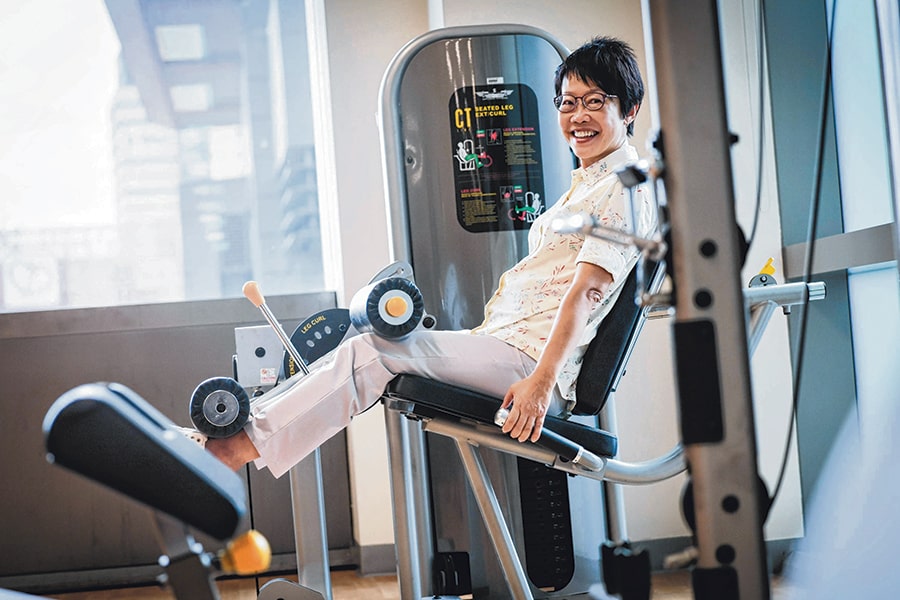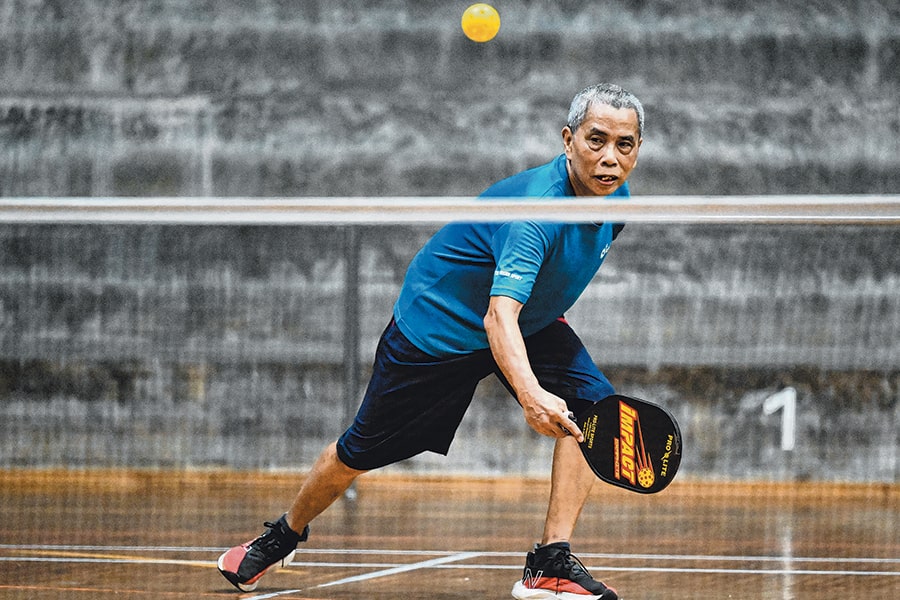 "Being fit and healthy lets me enjoy life more. I also like to eat and, with more muscle mass, I have better metabolism." - MS DIANA CHIN, who underwent knee preservation surgery at Singapore General Hospital in 2022
"Being fit and healthy lets me enjoy life more. I also like to eat and, with more muscle mass, I have better metabolism." - MS DIANA CHIN, who underwent knee preservation surgery at Singapore General Hospital in 2022
21 February 2024 (The Straits Times)
As Singapore’s population ages, more older people find sports and physical activity important to their quality of life
When knee pain stopped Ms Diana Chin from enjoying her regular weight-training regimen at the gym, the 64-year-old educator was eager for options to get back on her feet.
After trying physiotherapy and pain patches to no avail, she opted for knee preservation surgery at Singapore General Hospital (SGH) in 2022.
The operation realigned the bones in her leg to reduce the load on her knee joint and, within two months, she was back at the gym doing low-impact exercises. It took a year for her to stop limping and be completely pain-free, but Ms Chin says she is more active now than she was before. She is back to doing deadlifts, weighted squats and leg presses at the gym. She has taken up gardening, which requires her to bend and squat. She also did the challenging Ulsanbawi Rock hiking trail while on holiday in South Korea in October 2023.
"Being fit and healthy lets me enjoy life more,” says Ms Chin. “I also like to eat and, with more muscle mass, I have better metabolism." Doctors say more Singaporeans are opting for knee surgery to keep exercising even in the later years of life.
Knee operations may involve total or partial knee replacements, in which implants are used to replace parts of the knee joint which have been damaged by osteoarthritis.
These implants last for at least 10 years in over 90 per cent of cases. Then there are knee preservation operations that maintain the original knee through repairing a torn meniscus, or regenerating cartilage or reshaping the leg bones to address malalignment.
At Tan Tock Seng Hospital (TTSH), 760 knee replacement operations were performed in 2023, up from 670 in 2022. Over 90 per cent of these were total knee replacements, with the median age of patients being 68.
TTSH performed around 65 knee preservation operations in 2023, up from around 50 in 2022, according to
Adjunct Assistant Professor Kelvin Tan Guoping, a senior consultant and the hospital’s head of service (adult reconstruction).
Dr Tan says there has been an increase in the number of knee replacements and knee preservation operations over the years, except during the pandemic, when such operations were considered non-urgent and postponed.
In 2023, SGH did over 2,000 total knee replacements, about 50 more than the year before. Associate Professor Jerry Chen Yongqiang, consultant at SGH’s department of orthopaedic surgery, says demand for knee-related operations is growing for a number of reasons.
The population is ageing and people are more aware of their treatment options.
"Our population is also more active, so there’s a higher risk of high impact to the joint, leading to knee damage,” he says, adding that many patients seek surgery to return to an active life.
"More and more patients want to play tennis and golf or go hiking and diving on holidays. The goal is to bring them back to a healthier lifestyle."
Osteoarthiritis and Knee Damage
Knee surgery may be recommended for patients with osteoarthritis, which can wear away at the cartilage that supports the bones in the joints, leading to pain and difficulty in walking.
Eleven per cent of the population in Singapore could have knee osteoarthritis, according to studies published in 2016 and 2018. Older people are at higher risk of osteoarthritis, as are women, and those with gout or obesity. Previous injuries or fractures also increase one’s risk of developing osteoarthritis.
For example, in March 2023, Health Minister Ong Ye Kung had a partial knee replacement to address right knee pain arising from an injury sustained more than a decade ago, when he tore his meniscus while playing football in a labour union tournament. The knee joint has three compartments and osteoarthritis may affect one (unicompartmental) or all three (tricompartmental).
Different operations are recommended, depending on the number of compartments affected and the severity of the osteoarthritis. Ms Chin, for example, was happy to be found suitable for a knee preservation surgery called proximal fibular osteotomy, in which her leg’s bones were adjusted to redistribute weight across the knee joint.
While some of her peers have gone for knee replacements, she says the knee preservation route appealed since the surgery time was shorter and left a smaller scar.
Dr Lee Kong Hwee, senior consultant at SGH’s department of orthopaedic surgery, says knee preservation operations are often preferred by patients who do not want metal implants in their bodies. These operations are also more suitable for those with conditions such as dermatitis, poor immunity or poorly controlled diabetes.
He adds: "With knee preservation surgery, there’s also the option to go for total knee replacement later on. It’s about giving patients more choice."
Dr Tan added he has seen an increase in the number of patients who opted for knee preservation surgery.
They are often active individuals who are seeking to improve their knee pain to allow them to maintain their sporting lifestyle for as long as possible." - Adjunct Assistant Professor Kelvin Tan Guoping
Knee replacements may be recommended in cases of more severe osteoarthritis, which cannot be addressed through physiotherapy or other means.
Partial knee replacements might be recommended for people aged 40 and older, who have partial joint damage. Total knee replacements might be recommended for those over the age of 60 with severe osteoarthritis that limits their daily activities.
Low-impact sports for staying active
 Mr Shoo How Beng, 72, had a total knee replacement in 2020 and now enjoys playing pickleball. ST PHOTO: SHINTARO TAY
Mr Shoo How Beng, 72, had a total knee replacement in 2020 and now enjoys playing pickleball. ST PHOTO: SHINTARO TAY
Mr Simon Ng, 49, tore a knee ligament in secondary school, but continued to play futsal and badminton for two hours every week for years without issue. Then, in 2020, his left knee began to ache.
"I would feel the pain even if I didn’t play sports, even if I walked for 10 minutes," recalls Mr Ng, who works in an information technology company.
In 2023, he had a partial knee replacement. Within a couple of weeks, the married father of a teenager was able to walk without assistance.
He no longer plays high-impact sports, but has started going to the gym more frequently. “I want to stay healthy and active,” he says. "If I go through a period when I don’t exercise, I feel sluggish."
 Three months after a partial knee replacement in 2023, Mr Simon Ng was able to go on holiday in Japan. PHOTO: COURTESY OF SIMON NG
Three months after a partial knee replacement in 2023, Mr Simon Ng was able to go on holiday in Japan. PHOTO: COURTESY OF SIMON NG
Protecting the Knee
As the population of Singapore ages and is encouraged to stay more active, will the demand for knee operations continue to rise? Not necessarily, doctors say.
While there will be some increased demand, there are various ways to reduce the risk of developing osteoarthritis and requiring knee surgery.
Dr Chen of SGH says low-impact sports such as cycling and swimming are good options to stay active and reduce the load on the knee. Physiotherapy focusing on muscles, such as the quadriceps and hamstrings, can also be beneficial.
Dr Tan of TTSH says staying active will strengthen one’s core muscles and reduce the risk of obesity which, in turn, reduces the risk of developing osteoarthritis.
The key here is to avoid being obese and avoid injuries to the knees, so exercise safely and keep your weight under control,” -
Adjunct Assistant Professor Kelvin Tan Guoping
He also used to go for a 10km jog once a week until the knee pain became more severe in 2019.
On three occasions, the knee "clicked" and left him unable to walk for half an hour. He had total knee replacement surgery at SGH in 2020 and now plays pickleball – another racket sport – instead of badminton. He has also reduced his jogs to 3km once a week.
"To stay healthy, you need to exercise," he says.